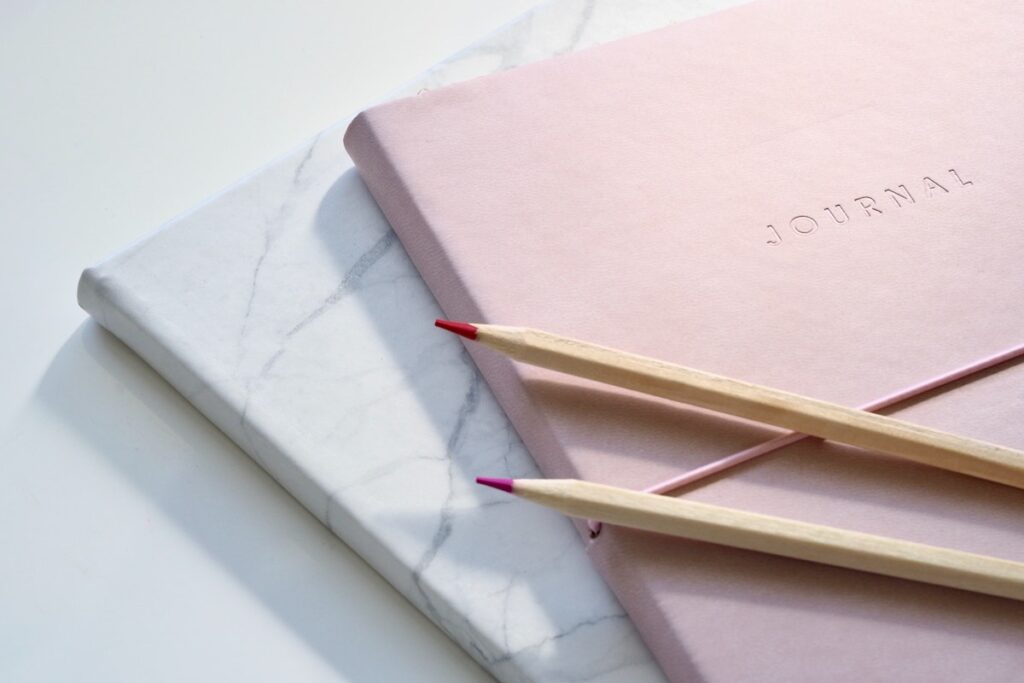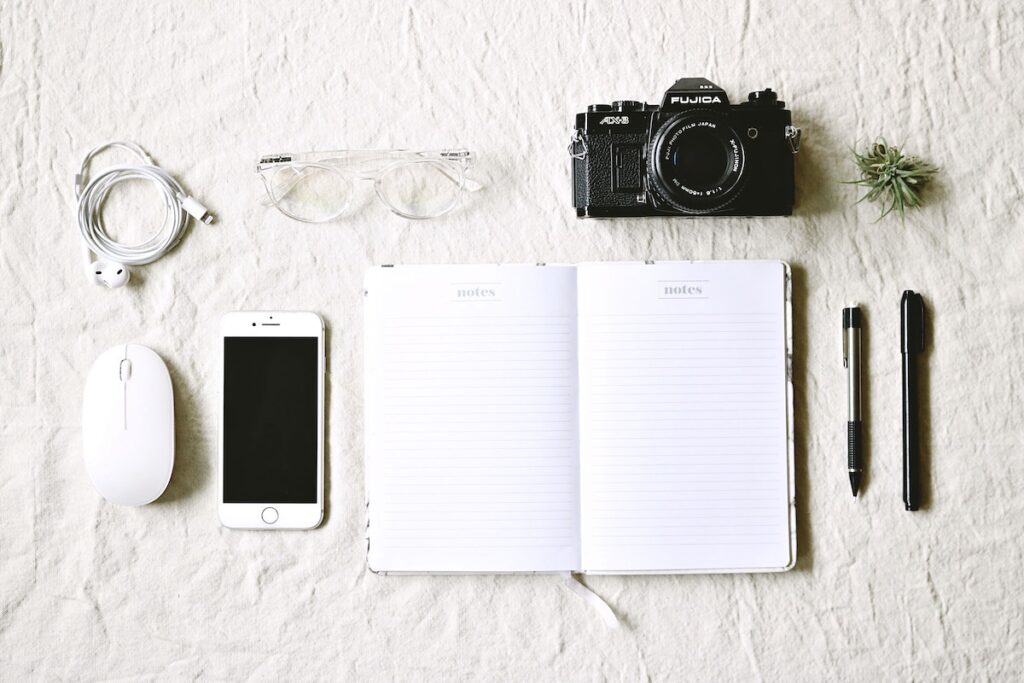HOW TO JOURNAL
Hey there! I see you’re thinking about journaling!
Well… you’re in the right place!
I’ve been journaling since I was in high school and I’m a testament to all of the positive effects journaling can have on your personal growth and self-development.
If you’re a beginner, you might be wondering how to journal at all. What do you write about? How do you start? What are the benefits of keeping a journal?
Let’s start with the advantages!
Here’s a Youtube video about the benefits of journaling if you’d like to hear them out:
The Benefits of Journaling
Journaling
- allows you to track patterns, improvements, and changes over time
- writing signals to your brain that what you’re doing is important
- boosts your emotional intelligence
- boosts memory and comprehension
- strengthens self-discipline
- helps identify negative thoughts and behaviors
- helps prioritize problems and fears
- boosts self-confidence
- journaling about positive experiences allows your brain to relive it
- can be an effective mental health tool with conditions like anxiety or depression

How to Journal
I’m going to let you in on a little secret… (You may have caught it in the video.) Are you ready?!
There are NO RULES when it comes to journaling!
If knowing that there are no rules bothers you, it’s probably because you want to know you’re doing it “right.”
BUT, it should actually bring you some relief! Your journal is for YOU!
Journal in the way that suits YOU best, meets YOUR needs, builds on YOUR strengths, and addresses YOUR weaknesses.
how to journal
There are different types of journals.
- CLASSIC JOURNAL
- This kind of journal is a blank page. You can choose to write daily or you can choose not to. You have creative freedom with this kind of journal and you can write about anything and everything you want.
- BULLET JOURNAL
- This journal is used to track things like; goals, fitness, projects, nutrition, wellness, tasks, etc., and (as the name implies) the entries are usually in bullet points or in a short-handed format.
- DIARY
- This type of journal usually has daily entries. You write about the events of the day and the experiences you had. This type of journal has been beneficial in helping me gain self-awareness. Writing interactions with people, when they happened, what was said, how I felt or responded, how I’m reflecting on it now. This helps me understand my part in things and can help me consider how interactions can be improved or strengthened moving forward. This can also be a good tool to use if you are in therapy and need help remembering things that happened since your last session.
- PRAYER JOURNAL
- Prayer journals can include a list of things you’ve prayed about or intend to pray about. This kind of journal can also function like a transcript of prayers and petitions you’ve brought to God. Some people even use it to keep track of prayers that have been answered. It’s refreshing to see moments where God responds to prayers you have already forgotten and it’s useful to see how your prayers have evolved over time as well.
- DREAM JOURNAL
- People don’t usually remember their dreams when they wake up and if they do, they often forget details soon after. Dreams can reflect how our brain is processing what’s happened in our life. We can find meaning in symbols and on a rare occasion, we might find that a dream of ours has actually come true. I remember having a couple dreams that felt like warnings (which I notated) and within the next year those dreams happened. People write their dreams down in dream journals. Write down everything. No detail is to big or too small. It’s also helpful to write down what a certain thing made you feel. That can help you with interpretation.
- GRATITUDE JOURNAL
- This journal encourages us to notice things that are positive. Usually, there are prompts asking what we are grateful for or what positive memories come to mind.
- PROMPTED JOURNAL
- When people don’t know where to start, this kind of journal can be very useful. Instead of spending 20 minutes wondering what to write about, there are pages in this journal with prompts asking a range of questions. Some prompts are fun and light-hearted while others are more thought-inducing. There are also prompted journals with specific purposes like wellness, self-exploration, positivity, etc.

how to journal
Materials you need in order to start a journal:
Really, all you need is something to write in. If you’re a beginner looking to start journaling, I recommend starting by using a paperback or hardcover journal and writing with pen and paper.
There’s something really powerful about getting a pen to paper. It makes is meaningful. Writing things down rewards our brain by making it feel like it matters. That positive reinforcement can be very motivating in the beginning. Take advantage of that!
But if you really don’t enjoy writing or you don’t like your handwriting or something, it’s perfectly fine to use technology.
You can use the note section on your phone, tablet, or laptop. You can use a note-taking application like Evernote or OneNote. You could even use Word or Google Docs to record your entries.
Like I mentioned before, journaling is all about YOU. So when you decide what kind of medium you want to write in, consider what would work best in your case.
What would get you most excited? What would help you follow-through in writing?
The number one journal I recommend for beginners is a journal with prompts. For these reasons:
- You won’t have to spend time worrying about what to write.
- It will give you a chance to notice what topics really pique your interest.
- Prompted journals might include topics that get you thinking and writing outside of your comfort zone.
- It will keep you focused on one topic.

How To Journal: When You’re Journaling as a Beginner
These tips apply most if you are
- free-writing in a classic journal,
- journaling to build emotional intelligence,
- or aspiring for self-development through writing.
Stewarding a growth mindset throughout the journaling process can be so crucial. So, I wanted to take a moment to share some tips to help you take care of your heart and your mind through it all.

- BE AUTHENTIC
- Allow yourself to be real. Face those emotions that are sometimes difficult to navigate. For example, many people don’t actually know how to let anger out in a constructive way. In the middle of an emotion like that, we shut down, lash out, or say things we didn’t mean. Keeping a journal can be a very positive outlet and it creates a safe space for you to vent without breaking anybodies heart.
- HAVE A GROWTH MINDSET
- Be constructive (when considering yourself and when considering others). Think of the future and consider the things that can be done better the next time around. If we’re not intentional, we’ll limit our journaling session to rumination (going over the same negative things in our minds over and over).
- DON’T JUDGE YOURSELF
- Make sure that you are a safe space for YOU. When you are writing with the intention of growing, it will be necessary to face yourself: the good, the bad, and the ugly. There is an aspect of self-development that requires us to own our story. It’s all part of the process and that’s okay!
- NOTICE THE POSITIVE
- The good stuff matters just as much, if not more so! Are there any other problem-solvers out there? I’ve had the tendency of being kind of relentless. If there’s a problem, I have to address it. I have to fix it. Immediately. I’ll have to explore that particular kind of anxiety with a therapist (lol). But – even in the middle of a personal growth journey – acknowledging the improvements, remembering the good things, celebrating the wins, can so powerfully impact our everyday happiness.
- BE REFLECTIVE
- Ask yourself questions. Ask yourself how you are doing, what the highlight of your day was, what triggered your reactions. This can be a great writing strategy to use in a classic journal when you are first starting out! (It’s probably one of the few occasions when asking and answering yourself can be applauded.) Also, read through your process. What patterns do you notice in how you think? How do you process emotion? How have you grown? What are you most proud of?
Listen to this podcast episode on HOW TO JOURNAL that includes a sneak peek into one of my journal entries: Click here




